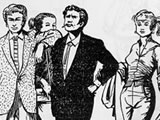What happened that day?
See historic events for any day of the year by entering the date below. Why not try your birthday?
Kiwi of the Week
Today in History

1954 Mazengarb report released
The Mazengarb inquiry into 'juvenile delinquency' blamed the perceived promiscuity of the nation's youth on the absence from home of working mothers, the easy availability of contraceptives, and on young women who enticed men into having sex.
Queen's Counsel Oswald Mazengarb was appointed by the government to chair the Special Committee on Moral Delinquency in Children and Adolescents on 23 July 1954. The committee was set up after an outcry over teenagers’ behaviour in Lower Hutt and other incidents such as a milk-bar murder in Auckland and the Parker-Hulme murder in Christchurch (the subject of Peter Jackson's 1994 movie Heavenly Creatures).
The 'Petone Incident' exemplified a particular concern. A missing 15-year-old girl had turned up at the Lower Hutt police station. In the report:
She stated that, being unhappy at home with her stepfather, she had … been a member of what she called a 'Milk Bar Gang', which … met 'mostly for sex purposes'; she … was worried about the future of its younger members, and desired the police to break up the gang.
Mazengarb dominated the committee and its proceedings: mindful of the National government’s wish to have the report completed before the imminent general election, he set the timetable for the committee’s investigation, dictated the tasks to be performed, and wrote or edited much of the report. Other committee members considered him ‘a puritan moralist’ and a ‘fundamentalist’.
The report blamed lack of parental supervision for juvenile delinquency and advocated a return to Christianity and traditional values. It also provided a basis for new legislation. Mazengarb assisted with the drafting of three acts recommended by the committee: the Indecent Publications Amendment Act 1954, which widened the definition of ‘obscene’ and ‘indecent’; the Child Welfare Amendment Act (No. 2) 1954, which enabled the Children’s Courts to treat children engaging in sexual behaviour as delinquent; and the Police Offences Amendment Act 1954, which made it an offence to sell contraceptives to children under 16 years of age.
The government sent a copy of the committee’s report to every home in the land. Bob Jones remembers the moral panic that ensued:
I can recall very vividly sort of hordes of police moving in on the school. And I can recall a couple of pupils were ejected, were expelled and disappeared off the scene.
I subsequently met Australians who had read about this in Australia and had come over here – I'm talking about chaps of about 19 and that – coming over to this sort of sexual festival – this great Mecca, rather like Bangkok, with the plane loads, the jumbo plane loads of Germans coming in there that's been going on in recent years – and of course they probably were bitterly disappointed I imagine.
Despite the public outrage it caused, the Mazengarb report was not a major issue in the November 1954 election. Even so, the report provides an interesting insight into the thinking of mainstream New Zealand society in the 1950s. In 2006 Russell Brown compared the paranoia surrounding its publication to the way in which the media have portrayed the issue of teenagers' use of social networking websites.
Image: Bodgies














